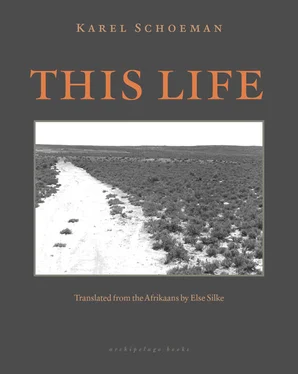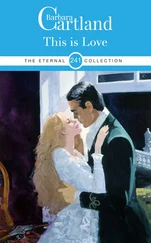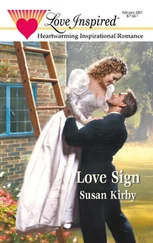Ouma with the gilded china teacups and bowls, Ouma who had brought along her own slave from the Bokkeveld — the only other thing I can remember is that Dulsie often spoke to me about the Ounooi, and that there was a plaintive note in her voice when she mentioned the old days. Why had I never listened to what she told me? She described how she had to iron the pleats in the Ounooi’s caps with a goffering-iron and how fastidious the Ounooi always used to be about her caps. And one evening when we were sitting together at the hearth in the kitchen, she took from some hiding-place where she kept her possessions a small bundle and unfolded it for me by the glow of the fire, a worn silk apron, embroidered with flowers, that the Ounooi used to wear for smart occasions and had later given to her when she could no longer use it. Why did I wait until now to reflect on these things; why did I never ask Dulsie about Ouma? She would have been able to remember Father and Mother’s wedding and where Mother had come from, she would have overheard what Oupa and Ouma had discussed in private without noticing the presence of the slave girl, and she would have known about the tension that existed between Mother and Ouma without their realising she was aware of it; like the silent child in the corner she would have had the opportunity to observe, and she had no special loyalty to Mother to prevent her from talking. So much of what I want to know to help me understand I would have been able to find out from the servants. But now it is too late, for Dulsie is dead and lies under one of those unmarked stone mounds beyond the encircling wall of the graveyard, and Gert and Jacomyn also left and are probably long dead like her, far beyond my reach, with all the knowledge they possessed. All I can do, is try and remember their voices and listen across the years to what they can still tell me where they talk among themselves, by the kraal wall, in the yard or in front of the hearth in the kitchen, without taking notice of the white child who is listening. I forgot about them; I forgot about their knowledge.
So the servants were also there, in and around the house and in the yard, that constant presence to which I can hardly attach names or faces any more, only an occasional voice, or a few words from a half-forgotten conversation, a gibe or a curse, a song or a rhyme. Gert’s name and face I can still remember, of course, for, like Dulsie, he was always there: he was a Baster, or so he always called himself, and he came to us when he was a young child, so young that in later years he no longer even knew where he had come from or who his parents had been. They just found him, Father once remarked smilingly, and so he grew up around the house and on the outskirts of our family, slept somewhere in the outbuildings, received food to eat from our table and was clothed in Father and the boys’ castoffs. He was the boys’ playmate, for they were more or less the same age, but between Jakob and him there was always a barely concealed animosity. “Jakob has still not forgiven Gert for the thrashing he got that day at the fountain,” Pieter said one day when he was taunting Jakob, that I can remember; and how, another time, Gert grew pale and rigid with anger, a knife in his hand — “Just lay a hand on me, white man, then you know what will happen to you.” Was it the same occasion, and who was he talking to? To Jakob, my memory tells me, but I do not know where that certainty comes from, only that I was a frightened onlooker in the corner of the kraal — the smell of the kraal dung I can remember, and the rough stones against my back, and my fear.
Dulsie in the house and Gert somewhere in the yard with the boys, working or fooling around, or playing — that is how I remember my childhood years. Jacomyn came only later, with Sofie, and then they left together and everything changed; but that was later. Of the herdsmen, however, I remember nothing. The men were in the veld with the sheep and built themselves shelters there, the women came to do our washing and smear our floors, and sometimes I played with the children, so that they stand out best in my memory though I cannot remember any one individual; barefoot children with ulcerous legs, in a skimpy dress or short trousers made of dressed skins or an old kaross. Later Mother did not want them near the house any longer, but later I myself had no further need of their company, later, when everything had changed; I only know that they were always around somewhere, behind the pear orchard or beyond the kraal wall, so that one accepted their constant presence without taking any further notice of them. The men were sometimes thrashed for being drunk or losing sheep, they were given notice or came to say they wanted to leave, and sometimes they simply disappeared during the night with their bundles, and only the black mark of their fireplace still showed where their shelters had stood.
In my childhood years we possessed only two farms, the one in the Roggeveld and our winter quarters in the Karoo, but an effort was already under way to extend our boundaries, and I know there was constant conflict with neighbours about disputed land ownership or beacons that had reputedly been moved, and one of my earliest memories is how Jan Baster was chased from his dwelling-place near the boundary of our land. I never learned the details of this either, but I can remember an elderly coloured man at our door, hat in hand, trembling and stammering with dismay at the injustice he had come to complain to Father about; I must have been young still, for I know I had become upset too without realising why. Father stood on the threshhold, silently, with Mother close behind him, and I remember her giving him a little nudge in the back; “Tell the Hotnot to go away!” she hissed. How well I remember it, Mother’s black dress and her words and that small, impatient gesture with which she urged him on. At some time or other it was discovered or decided that the land on which Jan Baster lived was part of our farm and he was told to leave, while, from his point of view, he maintained the land had belonged to him and his people for many years and his father had lived there at the fountain before him; and then Jakob and Gert rode over one evening, or they were sent, and they burned down the few small buildings at the fountain. Jakob and Gert were enemies, but in the isolation that was our shared lifestyle, none of us could afford to surrender to our feelings of animosity or affection: Jakob and Gert struggling together to bring the ox under the yoke or to pry the rock loose with the crowbar where they were stacking the kraal wall, their heads close together; Jakob and Gert riding over to Bastersfontein together to set fire to the dry thatch of the hartbeeshuisies.
How did I know this? It was probably mentioned at the dinner-table or it was eagerly discussed in the kitchen. Yes, and one evening, much later, old Dulsie snarled at Gert: “Jan Baster’s curse on you, both you and Jakob!” and Gert’s face clouded with anger in the dim firelight. “Old woman, just say another word …” His voice trails off in my ears, his face vanishes in the wavering shadow of the firelight, and I do not remember any more. But Jan Baster left, for what resistance could he offer after all, and where could he turn for help? And he and his family crossed the Groot River to Griqualand, I later heard the servants tell. Can I really remember it, that small procession with the rickety cart struggling down the road in the distance, drifting and bobbing over the waving shrubs of the veld with us watching them from the farm, and a voice telling me, “There go Jan Baster and his people”? After that our flocks were often sent to graze at Bastersfontein and our herdsmen erected their own dwellings there, and no one gave Jan Baster another thought, trembling with outrage before our door in his shabby suit of dressed skins. Who still knows today how the fountain got its name except me, lying awake here and suddenly remembering him? I never had an opinion or passed judgement, neither did the word injustice ever occur to me. There was just an old man in a suit made of skins, and a fountain where our flocks were sent to graze all the ensuing years.
Читать дальше












